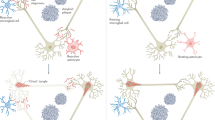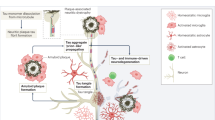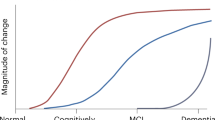Abstract
Alzheimer disease (AD) is one of the most prevalent chronic medical conditions affecting the elderly population. The effectiveness of approved antidementia drugs, however, is limited—licensed AD medications provide only moderate relief of clinical symptoms. Cognitive intervention is a noninvasive therapy that could aid prevention and treatment of AD. Data suggest that specifically designed cognitive interventions could impart therapeutic benefits to patients with AD that are associated with substantial biological changes within the brain. Moreover, evidence indicates that a combination of pharmacological and non-pharmacological interventions could provide greater relief of clinical symptoms than either intervention given alone. Functional and structural MRI studies have increased our understanding of the underlying neurobiological mechanisms of aging and neurodegeneration, but the use of neuroimaging to investigate the effect of cognitive intervention on the brain remains largely unexplored. This Review provides an overview of the use of cognitive intervention in the healthy elderly population and patients with AD, and summarizes emerging findings that provide evidence for the effectiveness of this approach. Finally, we present recommendations for future research on the use of cognitive interventions in AD and discuss potential effects of this therapy on disease modification.
Key Points
-
No disease-modifying drugs are available for the treatment of Alzheimer disease (AD) and the effectiveness of approved antidementia drugs is still not satisfactory
-
Non-pharmacological interventions could aid the prevention and treatment of AD, and combining pharmacological and non-pharmacological interventions might substantially alleviate the clinical symptoms associated with the disease
-
Neuroimaging studies could further our understanding of the neurobiological mechanisms underlying the effects of cognitive intervention on the brain
-
Health-care professionals must base recommendations concerning the use of cognitive intervention in mild cognitive impairment and AD on robust experimental evidence
-
No standardized intervention programs are currently available for the treatment of the diverse cognitive and functional impairments associated with the different stages of AD
This is a preview of subscription content, access via your institution
Access options
Subscribe to this journal
Receive 12 print issues and online access
$209.00 per year
only $17.42 per issue
Buy this article
- Purchase on Springer Link
- Instant access to full article PDF
Prices may be subject to local taxes which are calculated during checkout
Similar content being viewed by others
References
Weyerer, S. & Bickel, H. Epidemiologie Psychischer Erkrankungen im Höheren Lebensalter (Kohlhammer, Stuttgart, 2007).
Omerovic, M., Hampel, H., Teipel, S. J. & Buerger, K. Pharmacological treatment of Alzheimer's dementia: State of the art and current dilemmas. World J. Biol. Psychiatry 9, 69–75 (2008)
Angevaren, M., Aufdemkampe, G., Verhaar, H. J., Aleman, A. & Vanhees, L. Physical activity and enhanced fitness to improve cognitive function in older people without known cognitive impairment. Cochrane Database of Systematic Reviews, Issue 3. Art. No.: CD005381. doi: 10.1002/14651858.CD005381.pub3 (2008).
Sitzer, D. I., Twamley, E. W. & Jeste, D. V. Cognitive training in Alzheimer's disease: a meta-analysis of the literature. Acta Psychiatr. Scand. 114, 75–90 (2006).
Knapp, M. et al. Cognitive stimulation therapy for people with dementia: cost-effectiveness analysis. Br. J. Psychiatry 188, 574–580 (2006).
Spector, A. et al. Efficacy of an evidence-based cognitive stimulation therapy programme for people with dementia: randomised controlled trial. Br. J. Psychiatry 183, 248–254 (2003).
Buonomano, D. V. & Merzenich, M. M. Cortical plasticity: from synapses to maps. Annu. Rev. Neurosci. 21, 149–186 (1998).
Rapoport, S. I. Integrated phylogeny of the primate brain, with special reference to humans and their diseases. Brain Res. Brain Res. Rev. 15, 267–294 (1990).
Finch, C. E. & Sapolsky, R. M. The evolution of Alzheimer disease, the reproductive schedule, and apoE isoforms. Neurobiol. Aging 20, 407–428 (1999).
Palop, J. J., Chin, J. & Mucke, L. A network dysfunction perspective on neurodegenerative diseases. Nature 443, 768–773 (2006).
Valenzuela, M. & Sachdev, P. Can cognitive exercise prevent the onset of dementia? Systematic review of randomized clinical trials with longitudinal follow-up. Am. J. Geriatr. Psychiatry 17, 179–187 (2009).
Stern, Y. What is cognitive reserve? Theory and research application of the reserve concept. J. Int. Neuropsychol. Soc. 8, 448–460 (2002).
Stern, Y. Cognitive reserve and Alzheimer disease. Alzheimer Dis. Assoc. Disord. 20, 112–117 (2006).
Valenzuela, M. J. & Sachdev, P. Brain reserve and dementia: a systematic review. Psychol. Med. 36, 441–454 (2006).
Stern, Y. et al. Brain networks associated with cognitive reserve in healthy young and old adults. Cereb. Cortex 15, 394–402 (2005).
Oswald, W. D., Rupprecht, R., Gunzelmann, T. & Tritt, K. The SIMA-project: effects of 1 year cognitive and psychomotor training on cognitive abilities of the elderly. Behav. Brain Res. 78, 67–72 (1996).
Rovio, S. et al. Leisure-time physical activity at midlife and the risk of dementia and Alzheimer's disease. Lancet Neurol. 4, 705–711 (2005).
Yoshitake, T. et al. Incidence and risk factors of vascular dementia and Alzheimer's disease in a defined elderly Japanese population: the Hisayama Study. Neurology 45, 1161–1168 (1995).
Podewils, L. J. et al. Physical activity, APOE genotype, and dementia risk: findings from the Cardiovascular Health Cognition Study. Am. J. Epidemiol. 161, 639–651 (2005).
Laurin, D., Verreault, R., Lindsay, J., MacPherson, K. & Rockwood, K. Physical activity and risk of cognitive impairment and dementia in elderly persons. Arch. Neurol. 58, 498–504 (2001).
Larson, E. B. Physical activity for older adults at risk for Alzheimer disease. JAMA 300, 1077–1079 (2008).
Lautenschlager, N. T. et al. Effect of physical activity on cognitive function in older adults at risk for Alzheimer disease: a randomized trial. JAMA 300, 1027–1037 (2008).
Forbes, D. et al. Physical activity programs for persons with dementia. Cochrane Database of Systematic Reviews, Issue 3. Art. No.: CD006489. doi: 10.1002/14651858.CD006489.pub2 (2008).
Clare, L. & Woods, R. T. Cognitive training and cognitive rehabilitation for people with early-stage Alzheimer's disease: a review. Neuropsychol. Rehabil. 14, 385–401 (2004).
Clare, L., Woods, R. T., Moniz Cook, E. D., Orrell, M. & Spector, A. Cognitive rehabilitation and cognitive training for early-stage Alzheimer's disease and vascular dementia. Cochrane Database of Systematic Reviews, Issue 4. Art. No.: CD003260. doi: 10.1002/14651858.CD003260 (2003).
Grandmaison, E. & Simard, M. A critical review of memory stimulation programs in Alzheimer's disease. J. Neuropsychiatry Clin. Neurosci. 15, 130–144 (2003).
Baltes, P. B., Sowarka, D. & Kliegl, R. Cognitive training research on fluid intelligence in old age: what can older adults achieve by themselves? Psychol. Aging 4, 217–221 (1989).
Schaie, K. The optimization of cognitive functioning in old age: prediction based on cohort sequentional and longitudinal data. In Successful Aging. Perspectives from the Behavioural Sciences (eds Baltes, P. B. & Baltes, M. M.) 94–117 (Cambridge University Press, Cambridge, 1990).
Owen, A. M. et al. Putting brain training to the test. Nature 465, 775–778 (2010).
Ball, K. et al. Effects of cognitive training interventions with older adults: a randomized controlled trial. JAMA 288, 2271–2281 (2002).
Willis, S. L. et al. Long-term effects of cognitive training on everyday functional outcomes in older adults. JAMA 296, 2805–2814 (2006).
Belleville, S. Cognitive training for persons with mild cognitive impairment. Int. Psychogeriatr. 20, 57–66 (2008).
Petersen, R. C. et al. Current concepts in mild cognitive impairment. Arch. Neurol. 58, 1985–1992 (2001).
Gauthier, S. et al. Mild cognitive impairment. Lancet 367, 1262–1270 (2006).
Petersen, R. C. & Morris, J. C. Mild cognitive impairment as a clinical entity and treatment target. Arch. Neurol. 62, 1160–1163 (2005).
Mitchell, A. J. & Shiri-Feshki, M. Rate of progression of mild cognitive impairment to dementia—meta-analysis of 41 robust inception cohort studies. Acta Psychiatr. Scand. 119, 252–265 (2009).
Petersen, R. C. et al. Mild cognitive impairment: clinical characterization and outcome. Arch. Neurol. 56, 303–308 (1999).
Olazaran, J. et al. Benefits of cognitive–motor intervention in MCI and mild to moderate Alzheimer disease. Neurology 63, 2348–2353 (2004).
Rozzini, L. et al. Efficacy of cognitive rehabilitation in patients with mild cognitive impairment treated with cholinesterase inhibitors. Int. J. Geriatr. Psychiatry 22, 356–360 (2007).
Talassi, E. et al. Effectiveness of a cognitive rehabilitation program in mild dementia (MD) and mild cognitive impairment (MCI): a case control study. Arch. Gerontol. Geriatr. 44 (Suppl. 1), 391–399 (2007).
Cipriani, G., Bianchetti, A. & Trabucchi, M. Outcomes of a computer-based cognitive rehabilitation program on Alzheimer's disease patients compared with those on patients affected by mild cognitive impairment. Arch. Gerontol. Geriatr. 43, 327–335 (2006).
Troyer, A. K., Murphy, K. J., Anderson, N. D., Moscovitch, M. & Craik, F. I. Changing everyday memory behaviour in amnestic mild cognitive impairment: a randomised controlled trial. Neuropsychol. Rehabil. 18, 65–88 (2008).
Kinsella, G. J. et al. Early intervention for mild cognitive impairment: a randomised controlled trial. J. Neurol. Neurosurg. Psychiatry 80, 730–736 (2009).
Bottino, C. M. et al. Cognitive rehabilitation combined with drug treatment in Alzheimer's disease patients: a pilot study. Clin. Rehabil. 19, 861–869 (2005).
Requena, C. et al. Effects of cholinergic drugs and cognitive training on dementia. Dement. Geriatr. Cogn. Disord. 18, 50–54 (2004).
Giordano, M. et al. Combination of intensive cognitive rehabilitation and donepezil therapy in Alzheimer's disease (AD). Arch. Gerontol. Geriatr. doi: 10.1016/j.archger.2009.11.008.
Spector, A., Orrell, M., Davies, S. & Woods, B. Can reality orientation be rehabilitated? Development and piloting of an evidence-based programme of cognition-based therapies for people with dementia. Neuropsychological Rehabilitation 11, 377–397 (2001).
Loewenstein, D. A., Acevedo, A., Czaja, S. J. & Duara, R. Cognitive rehabilitation of mildly impaired Alzheimer disease patients on cholinesterase inhibitors. Am. J. Geriatr. Psychiatry 12, 395–402 (2004).
Requena, C., Maestu, F., Campo, P., Fernandez, A. & Ortiz, T. Effects of cholinergic drugs and cognitive training on dementia: 2-year follow-up. Dement. Geriatr. Cogn. Disord. 22, 339–345 (2006).
Farina, E. et al. Comparing two programs of cognitive training in Alzheimer's disease: a pilot study. Acta Neurol. Scand. 105, 365–371 (2002).
Farina, E. et al. Evaluating two group programmes of cognitive training in mild-to-moderate AD: is there any difference between a 'global' stimulation and a 'cognitive-specific' one? Aging Ment. Health 10, 211–218 (2006).
Spector, A., Davies, S., Woods, B. & Orrell, M. Reality orientation for dementia: a systematic review of the evidence of effectiveness from randomized controlled trials. Gerontologist 40, 206–212 (2000).
Belleville, S. et al. Improvement of episodic memory in persons with mild cognitive impairment and healthy older adults: evidence from a cognitive intervention program. Dement. Geriatr. Cogn. Disord. 22, 486–499 (2006).
Hall, C. B. et al. Education delays accelerated decline on a memory test in persons who develop dementia. Neurology 69, 1657–1664 (2007).
Kelly, C., Foxe, J. J. & Garavan, H. Patterns of normal human brain plasticity after practice and their implications for neurorehabilitation. Arch. Phys. Med. Rehabil. 87 (Suppl. 2), S20–S29 (2006).
Poldrack, R. A. Imaging brain plasticity: conceptual and methodological issues—a theoretical review. Neuroimage 12, 1–13 (2000).
Jansma, J. M., Ramsey, N. F., Slagter, H. A. & Kahn, R. S. Functional anatomical correlates of controlled and automatic processing. J. Cogn. Neurosci. 13, 730–743 (2001).
Sayala, S., Sala, J. B. & Courtney, S. M. Increased neural efficiency with repeated performance of a working memory task is information-type dependent. Cereb. Cortex 16, 609–617 (2006).
Hempel, A. et al. Plasticity of cortical activation related to working memory during training. Am. J. Psychiatry 161, 745–747 (2004).
Andreasen, N. C. et al. I. PET studies of memory: novel and practiced free recall of complex narratives. Neuroimage 2, 284–295 (1995).
Haier, R. J. et al. Regional glucose metabolic changes after learning a complex visuospatial/motor task: a positron emission tomographic study. Brain Res. 570, 134–143 (1992).
Elbert, T., Pantev, C., Wienbruch, C., Rockstroh, B. & Taub, E. Increased cortical representation of the fingers of the left hand in string players. Science 270, 305–307 (1995).
Olesen, P. J., Westerberg, H. & Klingberg, T. Increased prefrontal and parietal activity after training of working memory. Nat. Neurosci. 7, 75–79 (2004).
Petersen, S. E., van Mier, H., Fiez, J. A. & Raichle, M. E. The effects of practice on the functional anatomy of task performance. Proc. Natl Acad. Sci. USA 95, 853–860 (1998).
Wenderoth, N., Debaere, F., Sunaert, S. & Swinnen, S. P. The role of anterior cingulate cortex and precuneus in the coordination of motor behaviour. Eur. J. Neurosci. 22, 235–246 (2005).
Seidler, R. D. et al. Cerebellum activation associated with performance change but not motor learning. Science 296, 2043–2046 (2002).
Heiss, W. D., Kessler, J., Mielke, R., Szelies, B. & Herholz, K. Long-term effects of phosphatidylserine, pyritinol, and cognitive training in Alzheimer's disease. A neuropsychological, EEG, and PET investigation. Dementia 5, 88–98 (1994).
Small, G. W. et al. Effects of a 14-day healthy longevity lifestyle program on cognition and brain function. Am. J. Geriatr. Psychiatry 14, 538–545 (2006).
Stephan, B. C., Matthews, F. E., McKeith, I. G., Bond, J. & Brayne, C. Early cognitive change in the general population: how do different definitions work? J. Am. Geriatr. Soc. 55, 1534–1540 (2007).
Geslani, D. M., Tierney, M. C., Herrmann, N. & Szalai, J. P. Mild cognitive impairment: an operational definition and its conversion rate to Alzheimer's disease. Dement. Geriatr. Cogn. Disord. 19, 383–389 (2005).
Blennow, K., Hampel, H., Weiner, M. & Zetterberg, H. Cerebrospinal fluid and plasma biomarkers in Alzheimer disease. Nat. Rev. Neurol. 6, 131–144 (2010).
Hampel, H. et al. Biomarkers for Alzheimer's disease: academic, industry and regulatory perspectives. Nat. Rev. Drug Discov. 9, 560–574 (2010).
Dubois, B. et al. Research criteria for the diagnosis of Alzheimer's disease: revising the NINCDS-ADRDA criteria. Lancet Neurol. 6, 734–746 (2007).
Zetzsche, T., Rujescu, D., Hardy, J. & Hampel, H. Advances and perspectives from genetic research: development of biological markers in Alzheimer's disease. Expert Rev. Mol. Diagn. 10, 667–690 (2010).
Bokde, A. L., Ewers, M. & Hampel, H. Assessing neuronal networks: understanding Alzheimer's disease. Prog. Neurobiol. 89, 125–133 (2009).
Wimo, A., Winblad, B., Aguero-Torres, H. & von Strauss, E. The magnitude of dementia occurrence in the world. Alzheimer Dis. Assoc. Disord. 17, 63–67 (2003).
Tulving, E. & Thomson, D. M. Encoding specificity and retrieval processes in episodic memory. Psychol. Rev. 80, 352–373 (1973).
Breuil, V., Rotrou, J. D. & Forette, F. Cognitive stimulation of patients with dementia: preliminary results. Int. J. Geriatr. Psychiatry 9, 211–217 (1994).
Wilson, B. A., Evans, J. J., Emslie, H. & Malinek, V. Evaluation of NeuroPage: a new memory aid. J. Neurol. Neurosurg. Psychiatry 63, 113–115 (1997).
Wilson, B. Memory rehabilitation in brain-injured people. In Cognitive Neurorehabilitation (eds Stuss, D., Wincour, G. & Robertson, I. H.) 333–346 (Cambridge University Press, Cambridge, 1999).
Landauer, T. & Björk, R. A. Optimum rehearsal patterns and name learning. In Practical Aspects of Memory (eds Gruneberg, M., Morris, E. E. & Sykes, R. N.) 625–632 (Academic Press, London, 1978).
Glisky, E. L., Schacter, D. L. & Tulving, E. Learning and retention of computer-related vocabulary in memory-impaired patients: method of vanishing cues. J. Clin. Exp. Neuropsychol. 8, 292–312 (1986).
Wilson, B., Baddeley, A., Evans, J. & Shiel, A. Errorless learning in the rehabilitation of memory impaired people. Neuropsychol. Rehabil. 4, 307–326 (1994).
Taulbee, L. & Folsom, J. C. Reality orientation for geriatric patients. Hosp. Community Psychiatry 17, 133–135 (1966).
Boylin, W., Gordon, S. K. & Nehrke, M. F. Reminiscence and ego integrity in institutionalized elderly. Gerontologist 16, 118–124 (1976).
Acknowledgements
Charles P. Vega, University of California, Irvine, CA, is the author of and is solely responsible for the content of the learning objectives, questions and answers of the MedscapeCME-accredited continuing medical education activity associated with this article.
Author information
Authors and Affiliations
Contributions
V. Buschert, A. L. W. Bokde and H. Hampel all researched the data for the article, made substantial contributions to discussions of the content, and contributed equally to writing the article and to reviewing and/or editing of the manuscript before submission.
Corresponding author
Ethics declarations
Competing interests
The authors declare no competing financial interests.
Rights and permissions
About this article
Cite this article
Buschert, V., Bokde, A. & Hampel, H. Cognitive intervention in Alzheimer disease. Nat Rev Neurol 6, 508–517 (2010). https://doi.org/10.1038/nrneurol.2010.113
Published:
Issue Date:
DOI: https://doi.org/10.1038/nrneurol.2010.113
This article is cited by
-
Improvement in Motor Skills, Attention, and Working Memory in Mild Cognitive Impairment and Alzheimer’s Disease Patients Using COSMA Cognitive App
Augmented Human Research (2023)
-
Emergent creativity in frontotemporal dementia
Journal of Neural Transmission (2021)
-
Effects of virtual reality-based cognitive training in older adults living without and with mild dementia: a pretest–posttest design pilot study
BMC Research Notes (2019)
-
Clinical Management of Episodic Memory Changes in Dementia
Current Treatment Options in Neurology (2018)
-
The role of cognitive activity in cognition protection: from Bedside to Bench
Translational Neurodegeneration (2017)



